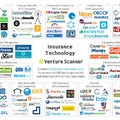
Portfolio.hu
István Palkó, Ádám Pál Turzó 24 January 2018
In 2-5 years blockchain based solutions may appear at Hungarian insurance companies as well, whereas in the long run the complete centralized model of insurance industry may be terminated by blockchain - says the CEO of Uniqa Biztosító Zrt. In the following interview he outlines how the new risk communities can be imagined, for whom the “valve” function of insurance companies could disappear, and insurance companies can then continue their operation as risk management experts. According to Krisztián Kurtisz the gaining ground of artificial intelligence is already visible, but automation is not always profitable yet. He talked us about the market opportunities of tech companies, just like to Amazon and Google.
A new phenomenon appeared in the radar of insurance companies in the past few years: blockchain. This technology and the related smart contracts may not only replace certain elements of the insurance value chain, but might even question the very existence of insurance companies - argue many. Do you agree with them?
In my estimation blockchain will have a bigger influence on the world, including the insurance industry than the Internet had.
While the Internet primarily accelerated information flow, thus making the already existing business models even more efficient, blockchain questions the business models themselves in the long run.
It’s not crystal clear from every aspect for what this technology can be used up to that point, still, our employees working at the IT and product related departments already participated at a training on this technology with the co-operation of the Budapest University of Technology and Economics.
What is blockchain about?

The operating principle of Bitcoin and its business notion is the co-called “distributed ledger”, i.e. a sort of ledger managed in a consensus, whereas its implementation technology, technical realization is blockchain. Bitcoin is a virtual currency that started to be used by the world first in this revolutionary system of blockchain. All previously concluded transactions appear in the database managed by blockchain, and this database contains exactly the same information in each and every computer of the network in a reliable manner, without the insertion of any central body or person. The opportunities of blockchain technology have been tested and studied at various areas from international transfers and commercial finances, to insurances or public administration. By using blockchain technology automatically functioning smart contracts can also be created, which contain all terms and conditions in a coded manner, and as a result they’re not only fast, but inviolable as well.
Blockchain might automatize contract based interactions and thus accelerate certain insurance processes. In all these what might threaten the current insurance models?
It’s not as simple as that. This technology, as it uses a distributed ledger open to anyone, can return the once existing transparency to the risk communities; this transparency has partially been lost because of the activities of insurance companies and the centralization having taken place due to the primarily paper-based character of the system.
Nowadays there’s a need for a centre that keeps records of the insurance bonds and claims, and this centre will be a sort of omniscient player. However, with the help of blockchain all these can theoretically be eliminated; the current model will be replaced by a distributed business model, completely transparent for the risk community both in claim settlement and bond management.
At the moment claim settlement is pretty complicated and requires lots of administration, because the insurance company very seriously investigates for whom to pay, when and under what circumstances. The insurance company is the valve protecting the risk community. However, in a blockchain technology not necessarily this type of valve is needed; the members of the risk community have an overview of the claim history of all other members.
What is the reality of the implementation of such solution anywhere in the world or perhaps in Hungary?
Complete transparency of course raises a lot of question: can such a community be established where each and every member agrees on this transparency? It might happen that the riskier members - i.e. the ones who rather take out their share from the community instead of giving their contribution are excluded from the community. In the current system of data protection regulations and requirements the legal feasibility of the model also seems to be far-fetched, and at the moment the complexity of the technology also hinders that great masses, that is the potential members of these risk communities can understand it thoroughly. Of course it doesn’t mean that this story is a mission impossible: it’s not easy to explain the operation of the Internet in two sentences, still it works properly and is used by everybody.
Is there anything that cannot be replaced by blockchain or sure and as such will remain to be the duty of insurance companies in the long run too?
In my opinion insurance companies might become risk management institutions; their biggest added value could be the fact that they know how to build a risk community, they know how to calculate the related risk factor, and they are the ones to administer all these in the most efficient and cheapest manner. Blockchain does not do away with the administrative pressure: the basic logic of administration as knowledge needs to be transferred and the network maintained together with its rules defined at the very beginning - and this might become the insurance company of the future.
What can be the role of technologies, such as robotics or artificial intelligence in this model of two kinds (the current and the future one)?
Classic administrative procedures are complicated, thus at certain points robots might come handy; however, if these procedures are reconsidered and simplified instead, then due to the radically decreasing complexity of the task robots won’t be required any longer.
On the other hand, artificial intelligence will become increasingly necessary, especially a kind of AI that is able to start to learn the character and behaviour of the risk community. It’s true that in an environment characterized with a completely distributed ledger logic (which is the very feature of blockchain) artificial intelligence needs to be applied differently (for lacking any centrally registered data), still, if for example a new member wishes to join the blockchain based network, the AI might advise the community whether to let that person join or not. All these go so much beyond the current global regulation and legal environment that these issues are rather about whether we want to switch over to a different, uncentralized social system.
What is close to us from all these future developments? For example when can blockchain and smart contracts enter the Hungarian insurance market?
In 2-5 years there’ll be solutions in Hungary where these will appear for sure, just like in Europe where there’re already cases exemplifying this approach.
Insurance companies have to undergo a very serious transformation. The insurance market has two branches, namely life and non-life, and this shows a product-based, not a client-based approach. In order to get to a point where the new technologies are applicable and efficiency is radically increased, first and foremost considerable standardization is required, for which the market should be segmented with a client-based approach (e.g. retail vs. corporate). Just like banks did it long ago.
How much is Uniqa ready to improve in this respect?
We’ve reconsidered insurance from its very basics. In the past 150-200 years due to the administrative burdens and the lack of technology extremely complex administrative procedures evolved in the sector, where the primary emphasis was not on the customer experience but on control instead.
There’re two potential directions. The first is when a classic insurance company simplifies its already existing processes (and not the product range), whereas in the second it’s not the existing ones which are digitized, but the reconsidered processes are digitally rebuilt from scratch.
We’ve opted for the second in our currently ongoing claim settlement-restructuring project, both at our customer service centre and on our new website, where there’s an algorithm learning the most frequently used operations and putting them forward. Based on our tests there’s 66% probability that one of the first three icons appearing in the screen leads to the page the client’s searching for.
How much do you rely on the developments provided to you by the Austrian Uniqa Group?
We’re in a fortunate situation, because we’re also used by the Uniqa Group as a quasi R&D lab. We have lots of developments the other subsidiaries also start to adopt. The mother company is increasingly acting as a controlling body, trying to harmonize processes where standardization is indeed highly important, e.g. in the areas of international legal compliance or risk management.
How fast can automation improve?
A lot depends on how educatable the clients are. Slowly but steadily they learn the operation of netbanks at their banks, and we, insurance companies have to perform a similar type of education. Nowadays they already perform part of the administrators’ work: the clients fill in the data for insurance claims, they can perform the necessary damage assessment themselves by using their mobile phones and send us the photos taken. Our colleagues are increasingly withdrawn from the process, and in parallel with that clients are increasingly involved. At the moment the option of smart phone based, camera assisted claim reporting is available for home insurances, but this option will soon be available for car insurances as well.
A hit, bigger than the Internet will soon cause an upheaval in our lives
How much cost saving can be resulted by the automation?
When a process is automatized it usually replaces administrator level colleagues. However, in order to design a process lots of process managers, IT experts and often also program developers are needed.
There’s often a multiplicator of 6-7 times between the two types of jobs as far as their salaries are concerned. So when one starts to work on a process like this, soon comes the question whether it is really worth it.
There’s a relatively long payback period following a significant investment cost. This is also the reason why it’s imperative whether the business is on a growth track and whether the development of a new business model starts from zero or not - as if it does, the related costs might be significantly lower. At the moment the administrative cost of insurance companies is in the range of 13-20% of the income, but if starting from zero, a company with single digit administrative burden could also be established.
As opposed to this it’s not the insurance companies starting from zero, but the well-known, huge tech companies endangering the market. In your opinion what is the chance of these players, I mean for example Amazon that is said to enter the insurance market (but not in Hungary)?
I think because of the economies of scale Hungary will not be among the ones really attractive for these players; they’d much rather focus on language-wise more homogeneous areas, populations. Just like Netflix arrived at us, slowly but steadily, these business models might also appear in Hungary. Nowadays an appropriate business model can be built upon a customer database and standardized technology, independent of borders. In the financial sector, with the exception of payment services, especially remittances, there isn’t a single model fulfilling both conditions. The duty of claim settlement is a special feature of insurance companies; at the moment nobody knows how the issue of a car damaged in Romania can be solved by a company providing its services from England without having the necessary contacts with a Romanian repair shop.
It’s also worth considering what the majority of the margin earned by the big tech companies is resulting from: that every insurance company and broker uses their platform for advertising purposes or that they also enter the insurance market? At the moment the first option provides much higher returns.
The General Data Protection Regulation (GDPR) is entering into force pretty soon, and many companies have a fear of data loss and fine in connection with that. Isn’t it a risk or market niche insurance companies should really consider to make use of?
Insurance is basically about having a risk community with a well-defined risk it wants to share. If it’s really about insurance, then it’s important to know what the related risk is. As no single fine has been imposed so far on the basis of the GDPR (the amount of the fines might be even up to some percentages of the income), the stakes are difficult to be estimate. It’s extremely complicated to insure a risk in a risk community about which it’s not really known what the expected insurance money is. On the other hand, there are already some crowdfunding business models in connection with the GDPR that are purely about how to sue the non GDPR compatible companies. If there’re some who want to make money from this, risk assessment is even more complicated.
GDPR, i.e. the new EU data protection regulation influencing almost every company from SMEs to big multinational corporations also in Hungary, is drawing near.
The appearance of self-driving cars can completely turn the insurance market and its car segment upside down. What’s your opinion about this?
In this issue the legislator needs to take the necessary measures in 10 years. At the moment it - rightly - insists on the viewpoint that the party running a dangerous business shall bear the related responsibility. As long as it’s not declared that self-driving exists in its own right, liability will remain with the operator, and some kind of third party liability insurance policy will need to be taken out. On the other hand it’s also obvious that the importance of this third party liability insurance will continuously decrease with private customers in the coming period. The more liability is attached to the producer in connection with accidents, the more corporate centred business third party liability insurance will become, instead of being a retail one. The complete system will turn around, because manufacturers will want to have as low premium as possible, especially for marketing reasons. I also think that no real self-driving can come true without transforming the central infrastructure. Just think about the sensors to be installed into the road and traffic light network that will allow the system to work smoothly, the data exchange and the infrastructure; all these need to be provided, and with that passenger safety will increasingly become a public duty.
There’s an area, however, which has almost remained intact from digitization: no breakthrough has been achieved in the sale of life insurances. When can one expect any change in that?
It’s a social issue how conscious behaviour self-support and family-support are. The majority of people can be embarrassed by three awkward questions pretty soon: 1) How much is your current income? 2) How much time would be needed by your spouse to earn the family’s current level of income without you in order to ensure the same standard of living, including the overhead expenses, the repayment of the loans, the schooling of the kids, etc.? 3) If a car hits you today what will happen to your family tomorrow? The digital channel wouldn’t be able to convey this dilemma without a personal mediator, because the human brain is not coded in a way to think about such questions; fortunately we’re created to be optimistic in serious dilemmas. This is the reason why a personal medium is needed to convey the message of life insurances. This year we’ve provided our agents with iPads and digital signatures - we eliminate paper from the system. So technology is not an obstacle of transmitting life insurances; but the absence of the above logic is.
A hit, bigger than the Internet will soon cause an upheaval in our lives
So there’s no chance for the radical transformation of the media?
The next 5-10 years will be very exciting regarding intermediaries. All sales channels will be present that will have developed up to that point. Clients of different ages and different circumstances make use of different channels.
The 50+ age group definitely uses agents. They know that the contract could be concluded online as well, but they do need somebody to explain the details for them. The 40-50 age group is open for online solutions, and even more, they’re also willing to make use of them, especially if they can gain some tariff advantage by doing so. This age group loves tariff comparison platforms and they are willing to do tariffing for 1.5 hours for a discount of HUF 30k. On the other hand, the 25-30 age group is not willing to spend their time with calculation, not even for a several thousand HUF difference. They value simplicity and fast intelligibility; so they mostly look for information in the own online platform of the insurance company without applying any comparison.
The youth is not present at comparison portals and they cannot be approached by networking equipment, so for this reason it’s important to develop simple online tools.
Finally what do you expect at the insurance market and at your own insurance company for 2018?
Uniqa started a transformation procedure two years ago as a result of which in 2016 (for the first time in five years) it became profitable. In 2017 we managed to increase our profitability further on, and this is what we’ll continue this year as well. We’re now getting to the point when with the help of a well-grounded, stable, growing business this year we can try out things we haven’t done so far in terms of product development or sales. In the second half of the year, more specifically in autumn we’d like to introduce new technologies and models. As for the entire market, economic growth, the increasing sale of new cars and the expanding retail investments act as a driving force for the sector, and if the related players can keep the costs and expenses well in hand, I presume 2018 will be a good year. Furthermore, as a result of the new regulations the entry level will be even higher in the insurance sector, which on the one hand makes insurance companies more protected, but on the other also reminds us of the fact that getting too comfortable is not the right track.
Read this:
Digital transformation is a myth!!
A bejegyzés trackback címe:
Kommentek:
A hozzászólások a vonatkozó jogszabályok értelmében felhasználói tartalomnak minősülnek, értük a szolgáltatás technikai üzemeltetője semmilyen felelősséget nem vállal, azokat nem ellenőrzi. Kifogás esetén forduljon a blog szerkesztőjéhez. Részletek a Felhasználási feltételekben és az adatvédelmi tájékoztatóban.



